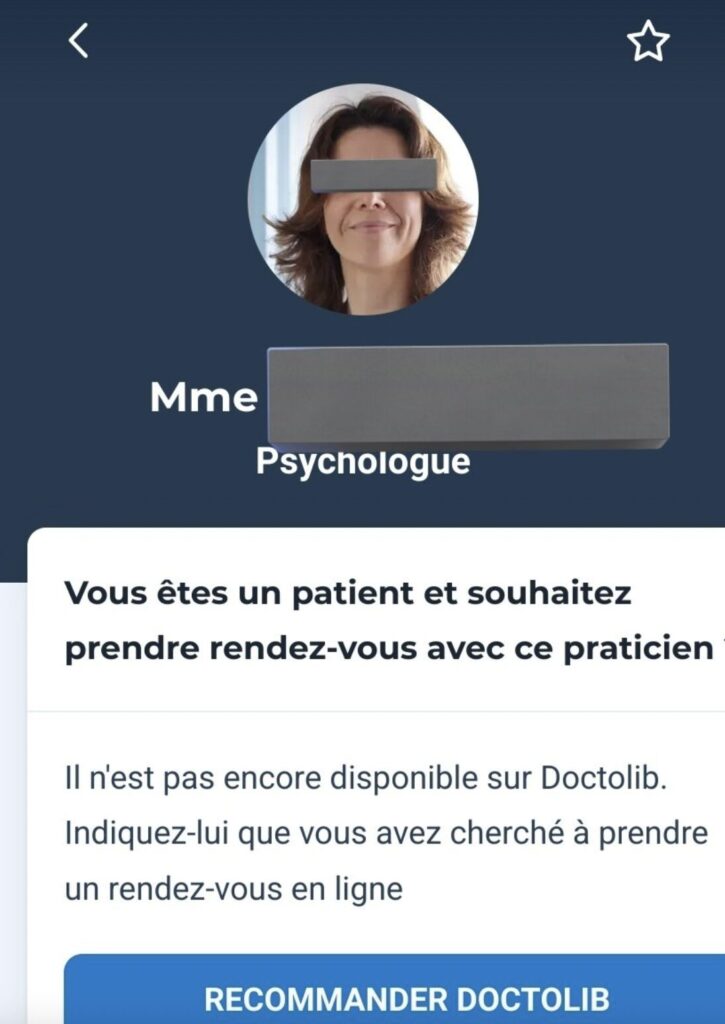On social networks, several practitioners recently protested at being listed on Doctolib, even though they had not requested it. If the platform acknowledges using the health directory to list their data, it ensures that it is possible for doctors who wish to have their page deleted in a few clicks.
“ Dr X is not on Doctolib », Indicates the page which is nevertheless dedicated to him. Although this doctor is not registered there, we can still find information about him, such as the address and number of his office, his hours and sometimes also the procedures he performs. While Doctolib is used to allow appointments to be made with health professionals, the company also hosts numerous pages like those of Dr. Health directory.
It is also from this directory and from public data that the platform draws to create these pages of practitioners, who are not contacted upstream to give their consent or not.
“ We list these doctors in order to facilitate access to care by allowing patients to find all practitioners with the right to practice, whether they are Doctolib clients or not, and to contact them via their address and telephone number. . It is a free service for the patient and the practitioner », Indicates Ismail Mansouri, communications director of Doctolib, to Numerama. Stated objective of the platform: “ Create and make available to the general public a directory of health professionals », based on public personal data available on institutional or public websites.

The CNIL alerted
Except that several doctors recently opposed this referencing of Doctolib, expressing their disapproval on the networks. In response to a tweet from an Ile-de-France resuscitator (@unreedu93) who denounced the practice, several of them recounted their dissatisfaction at having seen a file created without their consent. They also talk about the difficulties they have in closing this page. “ I had already alerted the National Commission for Information Technology and Liberties (Cnil) on this subject in 2022, explains the doctor at the origin of this thread on but I didn’t get a response. »
At Doctolib, we ensure that this process falls within the framework of the General Data Protection Regulation (GDPR). Contacted, the CNIL indicates that “private publishers of professional directories, who limit themselves, by default (i.e. without initiative from the people concerned), to redistributing “elementary” data on their activity (identity data, specialties/fields of expertise, contact details of the place of practice of the profession, etc.) may do so without the prior agreement/consent of the professionals concerned. »
“I had to pretend to be a customer to be able to contact them”
According to the doctor who denounced the practice, certain pages published by Doctolib contain information that did not appear in public directories. “There are pages for which the company collects information which probably comes from LinkedIn, Facebook or Instagram pages. Some doctors also told me that they had seen their cell phone number published on Doctolib, without their consent. », assures the resuscitator, who wished to remain anonymous.
In response to his tweet, several practitioners also explained that certain data in the sheet dedicated to them on Doctolib was incorrect. “ They gave me the telephone number of a neighboring office. I had to pretend to be a customer to be able to contact them », says an orthoptist.
Another problem raised by health professionals: once created, the file is rarely updated by the platform. If a practitioner changes office address or hours or retires, these changes may take several months or even years to appear, once they have been recorded by public directories. “ The pages are updated according to the updates we receive from Annuaire santé », defends Doctolib. An important point for the CNIL: “ Private publishers must guarantee the accuracy of the data disseminated by updating them as much as necessary. »
A way to prospect
For X’s resuscitation doctor, creating pages for healthcare professionals who are not clients would be a prospecting method to encourage doctors to use the platform. According to him, “ Practitioners listed, but not registered, receive notifications when patients looking to book an appointment with them click ‘recommend Doctolib‘. »
For its part, Doctolib ensures that it is possible for doctors to request the deletion of their page in a few minutes: all they need to do is fill out a form indicating the reason for the request. “ There are two scenarios, continues the communications director of Doctolib. 1. I do not want to be listed on Doctolib and 2. I have stopped practicing. After verifying the identity of the person who requested the deletion of the file, Doctolib proceeds with the deletion. » But here again, some doctors object to having to give personal information, notably their email address, in order to be able to delete a page that they did not request.
According to Ismail Mansouri, “ the files deleted at the request of practitioners represent 0.3% of the visible pages of Doctolib each year. In 2022, 1,200 deletion requests were validated, and in 2023, we deleted 1,100 practitioner files, out of a total of 375,000 files referenced on the site. » Moreover, Doctolib is not the only site for making medical appointments to offer contact details of doctors without them being registered: Qare, Keldoc, Clickdoc and other platforms also have pages devoted to information from practitioners who are not among their clients.
Do you want to know everything about the mobility of tomorrow, from electric cars to e-bikes? Subscribe now to our Watt Else newsletter!
